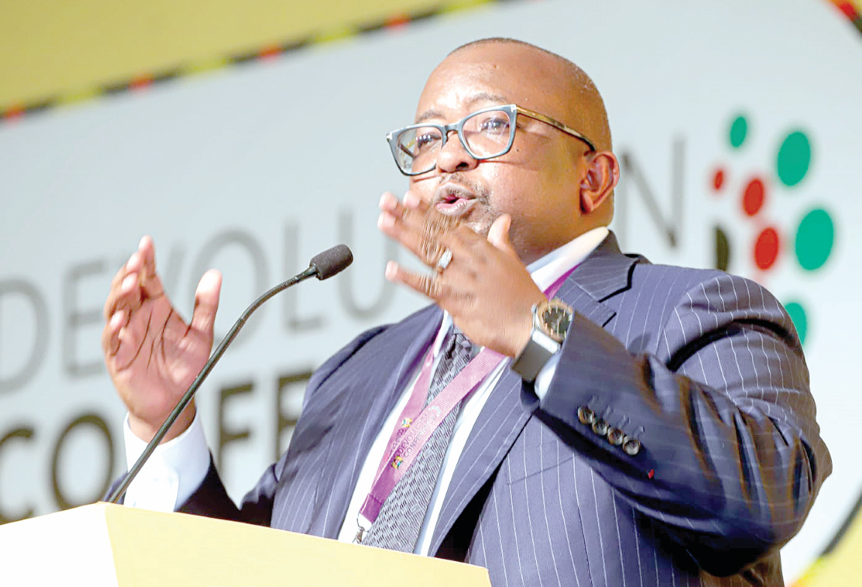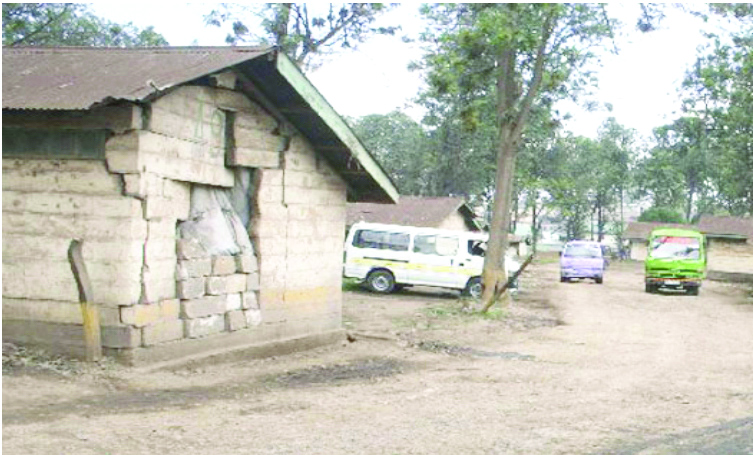Atwoli under siege as trade union bosses meet minister

The Central Organisation of Trade Unions (Cotu) is under siege once again after 12 trade unions met Labour and Social Protection Cabinet Secretary Alfred Mutua to chart a new future in the wake of technological revolution.
In what is likely to put him at loggerheads with Cotu Secretary General Francis Atwoli, Dr Mutua plans to regulate trade unions in a bid to address recurring labour issues in changing times.
Mutua, without mentioning names, said trade unions need to be at par with the changing times, citing the case of online workers who remain unrepresented.
The CS spoke on the eve of Atwoli’s scheduled meeting with shop stewards that will pave the way for the Labour Day celebrations on Thursday next week.
Mutua said the intention to regulate the labour movement is not meant to micromanage the trade unions but to create a fair playing ground for both teams.
“There comes a time when we should also talk about how we will continue to engage. There should be a framework going forward. Most times especially when there are strikes we see people complaining left, right and centre blaming the government. It has been created that way. However, going forward we want to have an engagement that will be forthright without perceptions,” said Mutua.
Mutua said for the longest time, the government has always been on the receiving end even on instances when the trade unions are on the wrong. “We should have conversations on how to address the issue of deductions, term limits of the officials and even drafting the collective bargain agreements CBAs.”
Mutua spoke after meeting the trade unions that had petitioned him to address some of the challenges facing workers, whom they said “stood at the brink of daunting siege, besieged by an array of threats that continually undermine their welfare.”
“On one side, traditional challenges such as paltry wages, job insecurity, and a lack of vital benefits loom ominously, creating a landscape rife with vulnerability,” the unions expressed concerns.
They further added: “On the other, a wave of emerging threats, fuelled by rapid technological advancements and shifting societal dynamics, further complicates an already precarious existence.”
The unions say today’s workers struggles against relentless tide of pain points that include meager pay that barely keeps pace with the soaring cost of living, hazardous working conditions that risk their health and the pervasive exploitation that strips away dignity and self-worth.
The unions that attended the meeting included: Kenya National Union of Teachers (Knut), Universities Academic Staff Union (UASU), Kenya Union of Domestic, Hotels, Educational Institutions, Hospitals and Allied Workers (KUDHEIHA), Law Society of Kenya(LSK), Kenya Medical Practitioners and Dentists Union (KMPDU), Kenya Hotel and Allied Workers Union (KHAWU), Union of Kenya Civil Servants (UKCS), Kenya Union of Clinical Officers (KUCO), County Government Workers Union (CGWU), Banking Insurance and Finance Union (BIFU) and Kenya Management Staff Union (KMSU) among others.
Six grievances
In what displayed a clear shift from Cotu, which is designed to lobby on their behalf, the unions presented Mutua with six grievances they want addressed.
They decried poor implementation and enforcement of collective bargaining agreement (CBAs).
“There is an urgent need for mechanisms to expedite dispute and resolution and enforce compliance,” the unions said in a joint statement.
They also raised concerns regarding the Salaries and Remuneration Commission (SRC) which they accused of watering down CBAs, by undermining the autonomy of employer-union negotiations.
“We request the CS for Labour and Social Protection to facilitate an engagement between SRC and public sector unions with a view of creating a working relationship between the commission and the public sector unions,” the unions said in a joint statement.
Other issues raised during the meeting include weak enforcement of labour laws, policy incoherence and proposed amendments affecting workers, freezing of employment and inadequate integration of special interest groups and ineffectiveness in the workplace inspection and enforcement of occupational safety standards.
“Unions decried the ongoing recruitment and promotions into top-level positions in the public sector, while vacant positions remain unfilled. This freeze on lower-tier employment disproportionately affects young professionals and graduates,” they said.
As such, the unions want the CS to create an effective linkage between Public Service Commission (PSC), Teachers Service Commission (TSC), County Public Service Board and Ministries and unions when it comes to employment matters.
The latest move is likely to rub Atwoli’s shoulders the wrong way.
Longest-serving unionist
Atwoli’s leadership at Cotu began in August 2001, making him the longest-serving trade unionist in the country. His tenure, however, has sparked frequent public debate, with many Kenyans questioning how long he plans to remain in office.
Atwoli has served Cotu as secretary general for 23 years, since he was first elected in 2001.
In his role as a representative of Kenyan workers, Atwoli has continued championing social justice by advocating decent work, accountable governments and better policies for workers.
This is not the first time the Cotu boss has addressed the retirement question.
In April, Atwoli said it’s not up to him to decide when to retire.
“Are you serving the people who gave you that mandate? That is the question. It is not me to retire; it’s them to say,” Atwoli said.
This is not the first time the government has initiated debate about management of trade unions. Last year, a new legislative proposal was put in place by Senator George Mbugua who proposed that trade unions should be prohibited from collecting agency fees from non-members.
This move, part of the Labour Relations (Amendment) Bill, 2024), has the potential to cost unions millions of shillings, especially affecting many county employees who rely on the negotiated benefits provided by their unions.
These fees help to support the operations of trade unions, which are funded by both member contributions and these additional fees.
However, some unions officials like Seth Panyako, the secretary-general of the Kenya National Union of Nurses, described the Bill as an attempt to “cripple trade unions, contrary to labour laws”.
“We definitely oppose that Bill. They are trying to kill trade unions by starving them. We will not allow that to happen,” he said.
Panyako also criticised the Bill’s origin in the Senate, arguing that labour issues are not a devolved function. “Trade unions are employers. We have staff. All these officials are employed by the unions. If you deny them the funds, then where do you want them to go?” he asked.
In June 2020, former Labour Cabinet Secretary Kazungu Kambi also brought about the debate that unions should join federations they wish to without being coerced. “The fact that Cotu has for many years been accorded the honour of being the sole national centre for trade unions does not mean that is the law,’ said Kambi.











